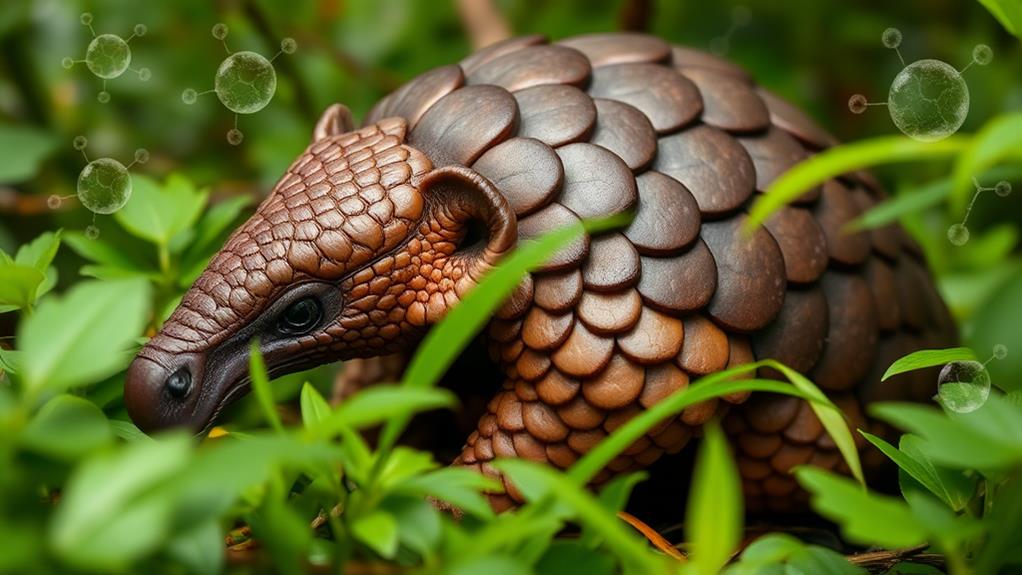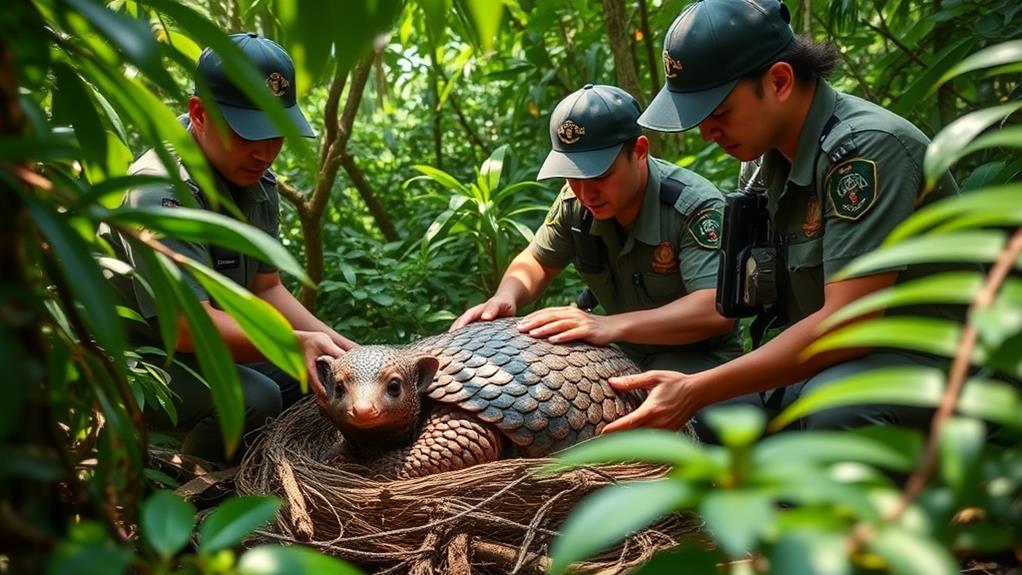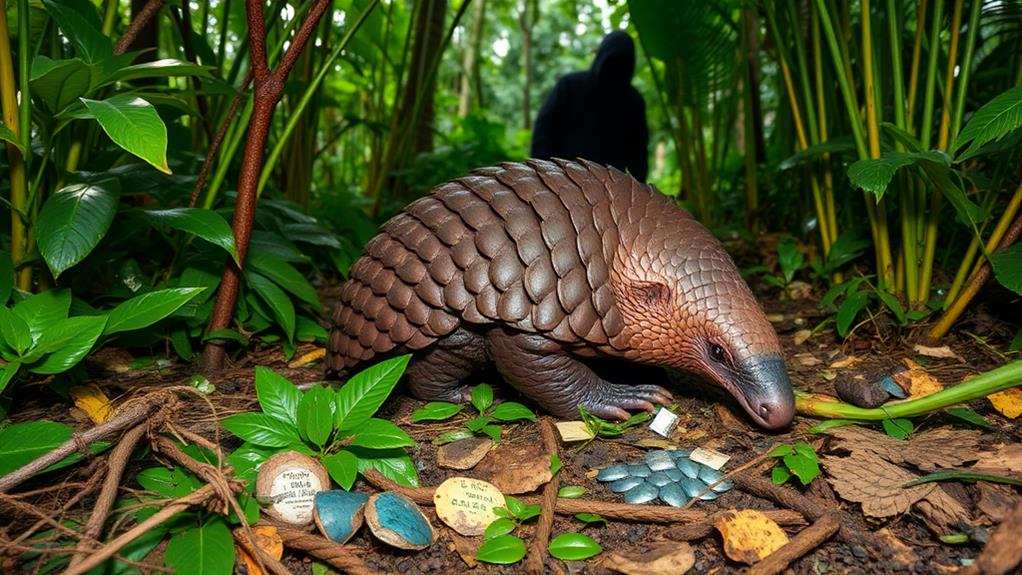The Philippine Pangolin's Fate Hangs in the Balance
The Philippine pangolin is the world's most trafficked mammal, with illegal trade numbers skyrocketing. This crisis demands immediate attention and action.
Stricter Enforcement and Community Awareness Are Crucial
To combat the illegal trade, stricter enforcement and community awareness are essential.
The Philippine Wildlife Resources Conservation and Protection Act aims to protect these scaly anteaters, but limited resources and lenient penalties often hinder progress.
Every Effort Counts
Each effort, big or small, contributes to a brighter future for the Philippine pangolin.
Raising awareness and pushing for significant changes are necessary to protect this incredible species.
By working together, we can make a difference and ensure the survival of the Philippine pangolin.
Pangolin Trafficking Overview

Pangolin trafficking is a severe crisis that requires immediate attention.
Pangolins are the most trafficked mammals globally, and their scales and meat are in high demand on the black market. The Philippine pangolin (Manis culionensis) is particularly vulnerable, being classified as an endangered species on the IUCN Red List.
Between 2000 and 2018, over 160,000 pangolins were seized worldwide.
In the Philippines, the illegal pangolin trade surged nine-fold between 2018 and 2019, with authorities confiscating around 6,894 pangolins during that time.
The illegal trade is driven by high demand and market value in countries like China.
Despite protective legislation like the Philippine Wildlife Resources Conservation and Protection Act (RA 9147), pangolin trafficking continues.
In 2013, 3,000 frozen pangolins were discovered on a Chinese fishing vessel, highlighting the urgent need to combat this illicit trade.
To protect the Philippine pangolin, we must take action.
We can raise awareness, support conservation efforts, and advocate for stricter enforcement of laws to ensure the survival of this species for future generations.
Legal Framework and Enforcement
The Philippine Wildlife Resources Conservation and Protection Act (RA 9147) is a crucial legal framework for protecting the critically endangered Philippine pangolin. This law explicitly prohibits the capture, trade, and possession of endangered species, including pangolins.
However, enforcement authorities face challenges in combating illegal trade due to incomplete confiscated specimens, making accurate species identification difficult.
Collaboration between authorities and experts is essential for effective enforcement. The Department of Environment and Natural Resources (DENR) and the University of the Philippines Diliman- Institute of Biology (UPD-IB) are working together to improve species identification through DNA barcoding. This is crucial for prosecuting wildlife traffickers.
Current penalties for wildlife trafficking in the Philippines are insufficient. Convicted traffickers can receive minimal sentences, such as a three-month prison term for trafficking ten live pangolins.
Stricter enforcement of existing laws and higher penalties for wildlife trafficking are urgently needed to deter this illegal trade and protect the endangered Philippine pangolin.
Molecular Identification Advances

Recent advancements in molecular identification are transforming the fight against wildlife trafficking, particularly for the critically endangered Philippine pangolin.
Collaboration between experts is key. The Department of Environment and Natural Resources (DENR) and the University of the Philippines Diliman-Institute of Biology (UPD-IB) are working together to enhance the identification of trafficked pangolin species using DNA barcoding techniques.
DNA analysis corrects misidentifications. This molecular forensics approach proved invaluable during the Tubbataha incident, where DNA analysis corrected misidentifications, demonstrating how genetic tools can bolster prosecutions in wildlife crime.
A DNA barcode database is being established. The creation of a Philippine DNA barcode database will facilitate accurate species identification, making it easier to take effective legal actions against wildlife traffickers.
Training programs strengthen enforcement capabilities. 18 individuals have been trained in DNA barcoding, enhancing the ability to combat wildlife trafficking.
Accurate species identification is crucial. With these initiatives, the illegal wildlife trade targeting the Philippine pangolin faces a formidable challenge. To effectively combat this illicit trade, it is vital to protect the habitats of the Philippine pangolin. This includes enforcing laws against deforestation and protecting nesting sites from human encroachment. By safeguarding their natural environment, we can help ensure the survival of this endangered species for future generations.
| Aspect | Details | Impact |
|---|---|---|
| Collaboration | DENR & UPD-IB | Enhanced molecular identification |
| Training Programs | 18 individuals trained in DNA barcoding | Strengthened enforcement capabilities |
| DNA Barcode Database | Under development | Accurate species identification |
WILDFORCE Lab Initiatives
WILDFORCE Lab Initiatives Advance Wildlife Forensics in the Philippines
The WILDFORCE Lab has been at the forefront of wildlife forensics in the Philippines since its establishment in 2015, with a specific focus on the critically endangered Philippine pangolin.
Accurate Identification Through DNA Barcoding
The lab utilizes DNA barcoding to accurately identify pangolins, combating illegal wildlife trade. This innovative approach enables the distinction between pangolin species, which is crucial in prosecuting wildlife crimes.
Empowering Researchers and Wildlife Enforcement Officers
The lab's training programs have empowered 18 researchers and Wildlife Enforcement Officers (WEOs), equipping them with essential skills in DNA barcoding and laboratory techniques.
This has strengthened local forensic capabilities, directly impacting the prosecution of wildlife crimes.
Revolutionizing Species Identification
The development of a Philippine DNA barcode database will simplify species identification, making it easier to tackle wildlife trafficking.
By decentralizing evidence processing to regional offices and local institutions, the WILDFORCE Lab has improved the efficiency and effectiveness of wildlife crime investigations.
Protecting Pangolins and Combating Illegal Wildlife Trade
These initiatives demonstrate a passionate commitment to protecting pangolins and ensuring their survival against the threats posed by illegal wildlife trade.
Collective Conservation Efforts

Collective Conservation Efforts Are Crucial
In the Philippines, uniting diverse stakeholders is vital in combating the illegal wildlife trade that threatens the Philippine pangolin. This collaboration involves government agencies, scientists, and local communities working together to create a robust framework to protect this endangered species.
Community engagement is essential, as local participation in conservation strategies significantly increases the likelihood of success.
Training Wildlife Enforcement Officers
Training programs for Wildlife Enforcement Officers (WEOs) focus on enhancing their skills to identify trafficked species and enforce wildlife protection laws effectively.
This training, combined with the establishment of the WILDFORCE Lab, highlights the importance of improving wildlife forensics capabilities through DNA barcoding, enabling better prosecution of traffickers.
International Collaboration
International collaboration plays a pivotal role in addressing the cross-border dynamics of pangolin trafficking.
By working together, countries can implement stricter penalties and allocate more resources to deter illegal activities that threaten the Philippine pangolin's survival.
Your Involvement Makes a Difference
Your involvement in supporting these collective conservation efforts can make a difference.
Surge in Illegal Trade
The Philippines is facing a severe pangolin crisis, with a nine-fold increase in illegal pangolin trade from 2018 to 2019.
During this period, authorities seized around 6,894 pangolins, highlighting the growing threat of illegal wildlife trade targeting these critically endangered species.
For instance, in September 2019, a staggering 1,154 kg of pangolin scales were seized in Palawan, underscoring the urgency of the situation.
The problem is even more severe than it appears, with detected seizures only representing a small portion of the illegal trade.
Between 2000 and 2017, only 740 pangolins were seized, suggesting that many more are falling victim to this ruthless trade.
For example, in 2020, 20 pangolins were confiscated from a local trafficker in El Nido, demonstrating the persistence of illegal activities.
To combat this crisis, enforcement agencies must take robust action, and individual efforts are crucial in supporting this fight.
Advocating for stronger policies and supporting organizations that protect pangolins can help secure a future for these unique creatures.
Confiscation and Rescue Operations

Confiscation and rescue operations are crucial in combating the illegal pangolin trade in the Philippines. A notable example is the confiscation of 1,154 kg (2,545 lbs) of pangolin scales in Palawan in September 2019, which highlighted the massive scale of illegal trafficking in the region.
Rescue operations not only remove pangolins from harm but also aid in their recovery. For instance, 18 live pangolins were rescued from urban areas near Manila over the past two years, exposing the disturbing trend of these vulnerable species being found in populated environments.
The seizure of 20 pangolins from a trafficker in El Nido in 2020 demonstrates the ongoing commitment to combat wildlife crime.
However, confiscated pangolins often face challenges adapting back into their natural habitats. This is due to stress and habitat loss, emphasizing the need for broader initiatives to address the persistent demand for pangolin products, which continues to threaten their survival.
Combating this demand is essential to ensure the future of these incredible creatures.
Market Demand and Consumption
The pangolin trade is a significant problem in the Philippines, driven by a hidden market that thrives on demand.
Pangolin meat is often pre-ordered at restaurants in Manila, revealing a disturbing appetite for this endangered species. Despite legal protections, the allure of pangolin products persists, entwined with traditional medicine practices and culinary customs.
Market demand drives the illegal trade, contributing significantly to the decline of pangolins.
Shops in Manila sell pills derived from pangolin parts, primarily manufactured in China, as part of traditional remedies. This underscores how deeply market demand drives the illegal trade.
Surveys show that many consumers remain unaware of the illegal status of pangolin meat and products, indicating a pressing need for education and awareness.
The illegal trade is thriving, with approximately 6,894 pangolins confiscated between 2018 and 2019.
Conservation efforts are essential to combat this demand.
By educating yourself and others about the impact of consuming pangolin products, you can help push back against this harmful trade. Together, we can protect the Philippine pangolin and ensure its survival for future generations.
Enforcement Challenges and Penalties

Wildlife trafficking in the Philippines is a significant challenge, particularly for the critically endangered pangolin.
The penalties for illegal wildlife trade are often too lenient, failing to deter criminals and undermining the seriousness of these offenses.
For example, convicted traffickers may receive only a three-month prison sentence and a fine of about USD 1,970 for trafficking ten live pangolins.
Wildlife Enforcement Officers (WEOs) face significant challenges in enforcing wildlife laws. Identifying species can be difficult, especially when confiscated specimens are mutilated, making prosecution efforts more complicated.
Additionally, WEOs are hampered by limited resources and inadequate training, making it hard for them to effectively combat wildlife trafficking.
The Department of Environment and Natural Resources (DENR) recognizes these issues and is advocating for stricter penalties, including mandatory minimum jail terms. These measures are essential to protect critically endangered pangolins and restore the integrity of wildlife laws.
To make a real impact, it's crucial to support these changes and empower WEOs to ensure that wildlife traffickers face consequences that reflect the severity of their crimes.
Conservation Status and Future Outlook
The Philippine Pangolin is Critically Endangered
The Philippine pangolin is classified as critically endangered on the IUCN Red List, with its population plummeting by up to 95% over the past 40 years. This drastic decline is primarily caused by poaching and the illegal wildlife trade.
Urgent Action is Needed
The illegal trade is rampant, with a nine-fold increase in confiscated pangolins from 2018 to 2019, resulting in nearly 6,900 seized. This highlights the need for immediate action to combat the ongoing demand for pangolin meat and scales.
Strengthening Law Enforcement
Current penalties for wildlife crimes are inadequate and fail to deter offenders. To combat this, effective law enforcement and stricter penalties must be prioritized to prevent the illegal trade from flourishing.
Raising Awareness and Community Engagement
Future conservation initiatives must focus on community engagement and awareness campaigns. By educating the public about the importance of pangolins in maintaining healthy ecosystems, we can foster a culture of protection and respect for these remarkable creatures.
Immediate support for conservation efforts is crucial to prevent the Philippine pangolin from vanishing forever.
Cultural and Economic Influences

Cultural and Economic Challenges to Philippine Pangolin Conservation
The conservation of the Philippine pangolin is hindered by deeply ingrained cultural and economic influences.
In many Asian cultures, pangolin meat is considered a luxury food and status symbol, driving demand in high-end restaurants and fueling the illegal trade. Additionally, traditional beliefs in the medicinal value of pangolin scales and blood further complicate conservation efforts, as people view these products as essential for health, despite the ecological consequences.
Cultural practices surrounding pangolin consumption directly conflict with conservation needs. For instance, souvenirs made from pangolin parts are marketed as exotic items, appealing to collectors and tourists and contributing to the illegal wildlife trade.
To address these issues, educational initiatives are crucial. By highlighting the ecological importance of pangolins, we can shift public perception and reduce cultural reliance on pangolin products.
Individuals can play a pivotal role in this change. Supporting conservation organizations, spreading awareness, and promoting alternatives to pangolin meat and products can help combat the cultural and economic challenges to conservation.
By working together, we can change the narrative and protect the Philippine pangolin for future generations.
Questions and Answers
Why Is the Philippine Pangolin Important?
The Philippine Pangolin plays a vital ecological role by controlling termite populations, which helps maintain forest health.
For example, a single pangolin can consume up to 200,000 termites in a single night, preventing them from damaging trees.
The pangolin is culturally significant, embodying traditional practices and values.
In some Filipino communities, the pangolin is considered a symbol of good luck and prosperity.
Conservation efforts are crucial to ensure the pangolin's survival.
Preserving its habitat is vital for biodiversity, as it supports a wide range of plant and animal species.
Legal protection is essential to combat illegal trafficking, which is a major threat to the pangolin's existence.
Why Is Pangolin so Expensive?
Pangolins are expensive due to high demand and illegal poaching. Their scales are highly valued in traditional medicine, driving up prices on the black market.
In Asia, pangolin scales are believed to treat various health issues, such as arthritis and cancer, leading to intense hunting and trafficking.
Pangolins play a vital ecological role. They control insect populations by consuming ants and termites, maintaining healthy habitats and ecosystems.
For example, a single pangolin can eat up to 200,000 ants in a single night.
Conservation is crucial to protect pangolins. With all eight species listed on the IUCN Red List, conservation efforts are necessary to prevent their extinction.
Protecting pangolins and their habitats ensures the long-term health of ecosystems and preserves biodiversity for future generations.
What Is the Problem With the Pangolin?
Pangolins are threatened by illegal wildlife trafficking, which has devastating effects on their populations. This illegal trade is driven by high demand for their scales and meat, leading to rampant poaching. As a result, pangolin populations are rapidly declining.
Habitat destruction is another major threat to pangolins. The destruction of their natural habitats, mainly due to deforestation and land conversion, leaves pangolins without a place to live and feed.
This, combined with illegal trafficking, pushes them closer to extinction.
Conservation efforts are hindered by these challenges. To combat these threats, public awareness campaigns are necessary to educate communities about the plight of pangolins.
Community involvement initiatives can empower locals to protect pangolins by providing them with the knowledge and skills to conserve pangolin habitats and prevent trafficking.
What Is the Most Trafficked Animal in the Philippines?
The pangolin is the most trafficked animal in the Philippines. This is due to the illegal wildlife trade, which poses a significant threat to its survival. As a result, the pangolin population has drastically declined.
Habitat loss and poaching are the primary causes of this decline, leading to a severe impact on biodiversity.
To combat this issue, conservation efforts are crucial. Raising public awareness about the pangolin's plight is essential to protect this unique creature.
Preserving its habitat is vital to safeguarding the future of pangolins.